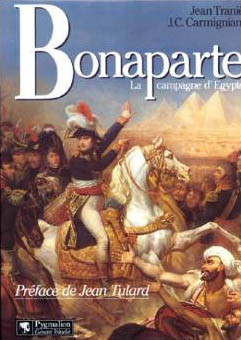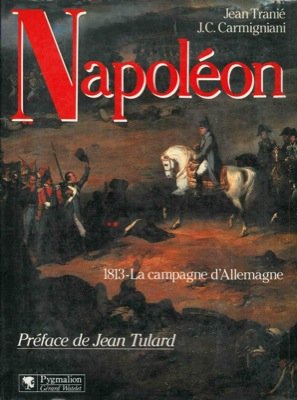History Prizes 1988
 Jean TRANIÉ et Juan Carlos CARMIGNIANI, Bonaparte et la campagne d’Égypte, Paris, Pygmalion / Gérard Watelet
Jean TRANIÉ et Juan Carlos CARMIGNIANI, Bonaparte et la campagne d’Égypte, Paris, Pygmalion / Gérard Watelet
In Spring 1798, the Directory, headed by Napoleon Bonaparte and Talleyrand, decided to tackle the English, not on its own soil, but in the Mediterranean, on the way to India. Thus began an amazing adventure: Napoleon secretly set off to Egypt, utterly unaware of the difficulties of such an enterprise. He managed to conquer the Mamluks, but when his fleet was destroyed, his plans fell apart. The follow-up to his campaign was just as dramatic: the work of the Institut d’Égypte revived the country, Egyptology was born with the discovery of the Rosetta Stone, and Champollion deciphered the hieroglyphs. The remarkable campaign is followed in this beautifully documented and illustrated book.
 Jean TRANIÉ et Juan Carlos CARMIGNIANI, Napoléon 1813, la campagne d’Allemagne, Paris, Pygmalion / Gérard Watelet
Jean TRANIÉ et Juan Carlos CARMIGNIANI, Napoléon 1813, la campagne d’Allemagne, Paris, Pygmalion / Gérard Watelet
In 1813 Napoleon was at the height of his powers. Right between the Russian campaign of 1812 and the campaign to defend France in 1814, the Emperor was confronted with the German question. Two key questions occupied his mind: would the strength of his army compensate for its inferiority in number? And would the Germans rise up against French domination and include Austria in the Prussian-Anglo-Russian campaign?
Jean Tranié’s book, supplemented with a superb iconography by Juan Carlos Carmigniani, fills a real gap in history and is suitable as a reference book. It thoroughly explores the causes, consequences and the military details of a campaign which Napoleon called ‘the triumph of the innate courage of the French youth, of the intrigue and cunning in English diplomacy, of the wit of the Russians and of the shamelessness of the Austrian cabinet.’
